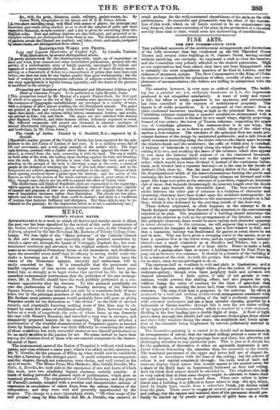MUSIC.
PERGOLESE'S STABAT MATER.
AtTILORRIATELY to a week in which all festive and secular music is silent, the. past one has been signalized by the revival of this early masterpiece of the Italian school of expression; given with new words, as the Oratorio of Calvary, adapted by the late Reverend Dir. Barham, of Trinity College, Cam- bridge. We lose sight of the "Mater doloroma " of the Catholic Church in this new arrangement, and especially of that poetical association by which a sister art, through the hands of Correggio, Raphael, &c., has com- municated sentiment and elevation to the original subject; which here ap- pears wan evangelical Protestant hymn on the Atonement, and dwells less upon the mournful event itself than its efficacy in saving sinful souls who make a becoming use of it. Whatever may be the opinion upon the views of the Protestant adapter, sincerity and enthusiasm will be- easily conceded to him. It is remarkable that the passionate and tearful expression of this severe and simple music should have pene- trated him so strongly as to beget wishes that survived his life; for he he-. queathed testamentary instructions that the publisher of his new arrange- ment, Mr. A. Novelle, should have the work publicly performed at a con- venient opportunity after his decease. To this personal peculiarity we owe the performance of Calvary on Tuesday morning at the Hanover Square Rooms; which was attended not only by a numerous body of ama- teurs, but by the,principal members of the profession in London. But for Mr. Barham most persons present would probably have still gone on giving Pergolesi eredit for his distinction as " the divine" on the faith of ancient records, and practically knowing nothing more of him than may be ob- tained by some few pieces of traditional celebrity. Here, however, we had before us a work of magnitude, the echo of whose fame, as was formerly- the ease with Mozart's Requiem, had travelled a long way in advance, and extensively prepared hearers for its reception, The °wagon afforded a confirmation of the truthful characteristics of Pergolesi genius as handed down by historians; and there was little difficulty in conceiving the author of those melodious but truly sorrowful strains as one himself predestined to be SU early wave to his passion for art. He seems indeed to have been among the shortest-lived of those who are entered composers in the immor- tal scroll of fame.
The instrumental score of the Stabat of Pergolesi is without wind-imam- meats, and even without a tenor part; which was added on this occasion, by Mr. V. Novell°, for the purpose of filling up what would now be considered too thin a harmony in the stringed parts. A small orchestra accompanied; and the singers, though not numerous were choice, and well versed in the style of music. The Kisses Pyne, Miss Mathews, Miss Sabilla Novell°, Mrs. Serle, A. Novell°, Sic. took part in the succession oaks and duets of which this work, save two charming fugued choruses, entirely consists. A truth of feeling pervaded the general style of performance, which gave us unmixed pleasure. The suspensions of Correlli's harmony, and the graces of Purcell's melody, mingled with a peculiar and characteristic sadness of expression in successions of minor keys, form the salient features of the composition and they were well and generally apprehended by the singers. The change to a more triumphant strain, "Oh what songs ofjoy and praises," sung _by Miss Sabina and Mr. A. Novello, was encored, as much, perhaps for the wellecontcasted cheerfulness of the *ylea the ahla performance. So successful and pleasurable wet the effect of the restoxki tion of this work, which on all hands seemed to be an acquaintance ten long dedayed„ that some extension of the plan, in the production of a olasaica nevelt,- from time to time, would seem not undeserving of consideration.


























 Previous page
Previous page